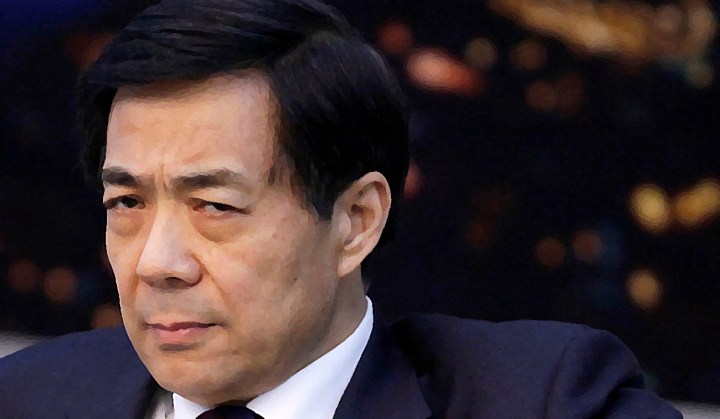Newsdeck
Bo’s ghost will haunt CCP congress

The Chinese Communist Party will find it easy to end disgraced former Chongqing party chief Bo Xilai's political and public life over corruption charges, but as the CCP prepares for its 18th National Congress, it cannot ignore the continuing popularity of his model to close China's wealth gap. The centre will also face some tough questions over Bo's meteoric rise. By WU ZHONG.
It is now certain that the Chinese Communist Party will hold its 18th National Congress in October or November. Preparations have gone smoothly: the new CCP committees of all 31 provinces and municipalities have been formed and the 2,200-odd deputies who will attend the all-important party congress have been “elected”.
Attention now should be directed to an informal gathering by incumbent and retired senior party leaders later this month or next month at the Beidaihe, an imperial summer resort about 250km north of Beijing. There, leaders will decide on a shortlist of candidates for the new party leadership to be “elected” at the 18th party congress.
Following adopted practice, the current Central Committee of the CCP will hold its last plenary session shortly before the opening of the 18th party congress, to formally endorse the shortlist of candidates worked out at the Beidaihe gathering and set the congress agenda.
This time around, the plenary session will have to deal with an extraordinary affair: deciding the fate of the disgraced Bo Xilai. Bo was sacked as Chongqing party chief in mid-March and put under investigation for his possible involvement in the murder of British businessman Neil Heywood by Bo’s wife, GuKailai, and suspected corruption. His Politburo and Central Committee memberships have been suspended, but he still retains his party membership. In China, a CCP member can’t face public prosecution unless his party membership is revoked.
Bo’s case happened under the current CCP leadership, so the mess has to be cleaned up before the power transition. Hence, it is widely expected that Bo will be stripped of his party membership and handed over to public prosecution before the opening of the 18th party congress.
This is just a formality. Whatever legal punishment Bo may be given, his fate is already set: he will disappear from China’s political and public life for a long time, if not forever, though it is extremely unlikely that he’ll be executed.
However, it is by no means certain that the influence of Bo and especially his so-called “Chongqing model” will be easily wiped out. The Chongqing model aimed at enhancing government’s role in economic development through investment and better distribution of social wealth, to narrow the wealth gap created in the past three decades of economic reform and opening up.
Under Bo, the Chongqing government allocated funds to build low-cost housing for low-income families, subsidised education for children from poor families, and increased government investment to create more jobs.
In Bo’s own words, the Chongqing model aimed at a more even slicing of the cake of economic development. On 3 July 2011, Bo told a guest from Hong Kong that Chongqing under him had taken a different road of development from other provinces and municipalities. The municipality had put fairer and better division of the cake as a higher priority than making the cake bigger.
Citing Deng Xiaoping’s saying that “some people must be allowed to prosper first but the ultimate goal is for common prosperity”. Bo added: “Some people in China have indeed become rich first, so we must seek the realisation of common prosperity.” Last July, Bo reiterated that Chongqing would not wait until it became “developed” to study a reasonable distribution of wealth and common prosperity.
At a time when the rich become richer and the poor poorer, Bo’s practice in Chongqing surely has won considerable popular support. This was evident given evidence that a number of grass-roots people in Chongqing still remember him. July 3 marked his 63rd birthday, and at some bus stations and public places in Chongqing, there appeared hand-written and spray-painted messages saying “Happy birthday to you, Secretary Bo!” and “We always remember you, Secretary Bo!”
How serious China’s wealth disparity is would be anyone’s guess because the Chinese government has since 2000 refused to release the nation’s Gini Coefficient – a common measure of income inequality adopted internationally. “The main reason,” National Bureau of Statistics director Ma Jiantang said, “is that data on high-income groups is incomplete.” Some experts criticised the announcement, saying “the government is looking for reasons to de-emphasize China’s significant wealth gap,” according to the Chinese publication Caixin.
But shortly before he was pulled down, Bo himself disclosed the “state secret” on 9 March – at the annual session of the National People’s Congress, saying that China’s Gini Coefficient had exceeded 0.46 in 2011. As such, he warned, China’s wealth gap had exceeded the point that could trigger social unrest.
He added: “As Chairman Mao said as he was building the nation, ‘the goal of our building a socialist society is to make sure everyone has a job to do and food to eat, that everybody is wealthy together’.”
Bo went on. “If only a few people are rich, then we’ll slide into capitalism. We’ve failed. If a new capitalist class is created then we’ll really have turned on to a wrong road.”
Though the figure Bo disclosed was a bit lower than the World Bank-estimated 0.47 in 2009, it was still much higher than the internationally accepted threshold of 0.4, which indicates that income inequality may threaten social stability. The timing Bo chose to make the disclosure was intriguing. He apparently wanted to make a last effort to draw public attention to his Chongqing model, knowing that his days were numbered.
What is more interesting was that Chongqing under Bo was able to attain fast economic development while concentrating on wealth redistribution. Bo was appointed to the office as Chongqing party chief in November 2007. Under his leadership, Chongqing’s gross domestic product grew 14.5% in 2008, 14.9% in 2009, 17.1% in 2010 and 16.4% in 2011, leading other provinces and municipalities.
Even the CCP cannot deny the achievement, though it has tried hard to play down Bo’s role in it. Vice Premier Zhang Dejiang, who was elected as the secretary of the newly formed Chongqing party committee last month, said the growth in Chongqing in past years was achieved “collectively by the municipal party committee and government”.
Whatever conclusion the CCP may draw on Bo, the new leadership of the party must address the problem of the widening wealth gap. In this regard, Bo’s experiment in Chongqing will likely be remembered and studied.
However, his attempt to narrow the wealth gap, like his other political ploys (such as his Maoist “Red Songs” and crackdown on crime) can be seen as part of his manoeuvring to move up the bureaucratic ladder.
The CCP will likely have to answer some embarrassing questions when the dust settles. The public may ask, for example, how “such a person” could have come so close to becoming a Politburo member? (Bo might have been promoted to an even higher position if former Chongqing police chief Wang Lijun hadn’t walked into a US consulate in February, carrying secrets that could assist in Bo’s downfall). The Chinese may ask how Bo could be allowed to do whatever he wanted under his jurisdiction without any checks or supervision.
No doubt, Bo’s case has severely damaged the image of the CCP. A bitter lesson the CCP should draw from Bo’s case is how to prevent similar cases from occurring again. DM
Credit: This edited article is used courtesy of Asia Times Online (http://www.atimes.com/), who retain copyright.
Photo: Bo Xilai (Reuters)




















 Become an Insider
Become an Insider